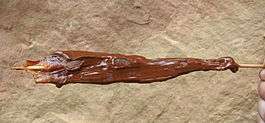Skewer


A skewer is a thin metal or wood stick used to hold pieces of food together. They are used while grilling or roasting meats, and in other culinary applications.
Metal skewers are typically stainless steel rods with a pointed tip on one end and a grip of some kind on the other end for ease of removing the food. Non-metallic skewers are often made from bamboo; however, any suitable wood may be used. Prior to grilling, wooden skewers must be soaked in water to avoid burning.
History
Excavations in Santorini, Greece, unearthed stone sets of barbecue for skewers used before the 17th century BC. In each pair of the supports, the receptions for the spits are found in absolute equivalence, while the line of small openings in the base formed a mechanism to supply the coals with oxygen so that they remained alight during its use.[1] Mycenaean Greeks used portable tray as grills. These trays were rectangular ceramic pans that sat underneath skewers of meat but it is not clear whether these trays would have been placed directly over a fire or if the pans would have held hot coals like a portable barbecue pit.[2][3] Homer in Ilad (1.465) mentions pieces of meat roasted on spits (οβελός).[4][5][6][7] In Classical Greece, a small spit or skewer was known as ὀβελίσκος (obeliskos),[8][9] and Aristophanes mentions such skewers being used to roast thrushes.[10]
Other uses
Small, often decorative, skewers of glass, metal, wood or bamboo known as "olive picks" are used for garnishes on cocktails and other alcoholic beverages.
Many types of snack food are sold and served "on a stick" or skewer, especially at outdoor markets, fairs, and sidewalk or roadside stands.
See also
References
- ↑ To Vima (in Greek), 6-2-2011 (picture 2 of 7)
- ↑ Ancient Greeks Used Portable Grills at Their Picnics, LiveScience
- ↑ How to Cook Like a Mycenaean, Archaeology Magazine
- ↑ Homer, "Iliad" 1.465, on Perseus Digital Library
- ↑ Ancient Wine, Patrick E. McGovern
- ↑ Wright, Clifford A. (1999). A Mediterranean Feast. New York: William Morrow. pp. 333.
- ↑ Grigson, Jane (1983-01-01). Jane Grigson's book of European cookery. Atheneum. ISBN 9780689113987.
Kebabs were as popular among the ancient Greeks as they are today. Homer tells us how Achilles organised a barbecue when he had envoys from Troy to dinner.
- ↑ ὀβελίσκος, Henry George Liddell, Robert Scott, A Greek-English Lexicon, on Perseus, dim. of ὀβελός (obelos), ὀβελός, ibid.
- ↑ Jack, Albert (2010-09-02). What Caesar Did For My Salad: The Secret Meanings of our Favourite Dishes. Penguin Books Limited. ISBN 9780141929927.
ancient Greeks from Homer to Aristophanes wrote about an earlier variant of the kebab, the obeliskos (meaning 'little spit' [...]
- ↑ Acharnians 1007
External links
| Wikimedia Commons has media related to skewer. |